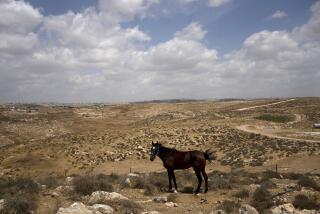Rabin Reassures PLO on Settlements : Mideast: He tells Arafat that existing Jewish communities will not be expanded, no new ones will be started. Palestinian leader seems mollified.
- Share via
JERUSALEM — Amid mounting controversy over Jewish settlements in the West Bank, Israeli Prime Minister Yitzhak Rabin on Thursday assured PLO Chairman Yasser Arafat that his government will not establish new settlements or expand the current ones beyond their existing borders.
Arafat, who has come under intense pressure from Palestinians angered by recent Israeli land seizures, seemed mollified by Rabin’s pledges and backed away from a confrontation over the issue.
Palestinian officials said Rabin gave Arafat a “package of substantial and specific assurances,” including a proposal to fence off settlements to keep them from spreading onto Arab-owned or state land.
Arafat, who had been urged to suspend all negotiations with Israel until the settlement question was resolved, said he was not completely satisfied. But he joined Rabin in emphasizing the need to press forward with Palestinian self-rule throughout the West Bank.
Rabin said Israel’s recent confiscations of Arab-owned land in the West Bank were for highway construction, not housing. He said the new roads would permit Israeli settlers and soldiers to drive around Arab towns and villages and thus hasten the military pullback in the region.
Palestinians fear, however, that the settlers have embarked on a land-grab campaign ahead of negotiations, due to begin in May, 1996, on the final status of the West Bank and Gaza Strip.
*
Israeli news media this week reported that the government plans to build as many as 30,000 homes for Jews in occupied areas, mainly around Jerusalem, in the next four years.
“We discussed in depth the confiscation of land (and) building of new settlements, and Mr. Rabin clarified his position,” Arafat told a press conference after the two-hour meeting at Erez, on the border of the Gaza Strip and Israel. “I think we should continue to coordinate between us.”
Ahmed Korei, the Palestinian economy minister and a senior Palestine Liberation Organization negotiator, said later that the meeting was positive.
“We felt the Israelis understood the danger posed to the peace process by settlement activity,” he said.
One pledge given by Rabin, Korei said, was that fences would be erected around all settlements within 50 yards of existing homes to prevent residents from expanding them.
No confiscation of land for housing and no government funds for expansion would be allowed under the restrictions, which will also apply to Jerusalem’s satellite towns that have not been incorporated into the municipality.
The pledges, based on government decisions made in November, 1992, were denounced by the Israeli opposition as “appeasement,” “total capitulation to terrorism” and “a political collapse.”
Leaders of Jerusalem’s suburban settlements threatened to paralyze the city with protests if the government halts construction in their communities.
“This is a declaration of war against hundreds of thousands of Israelis, and we won’t stand by just watching,” said the mayor of Maale Adumim, a settlement of more than 20,000 east of Jerusalem.
Arye Deri said his ultra-Orthodox Shas party will not rejoin the government, as agreed, if development of Jerusalem’s outlying settlements is halted.
Despite opposition from settlers and right-wing parties, government officials said Rabin is now determined to proceed with Palestinian rule in the West Bank, including Palestinian elections and the pullback of Israeli forces.
Rabin told Arafat, however, that he would sign such an agreement only when all the details, particularly measures to ensure Israeli security, have been worked out--negotiations that will probably take several months and delay elections until the summer or even autumn. The elections and the accompanying redeployment were originally scheduled for last July.
“I would like to stress that there are difficulties,” Rabin told a press conference. “The Israelis are bothered by the terror, the Palestinians by the settlements and land (issue).
“We have to focus on the continuation of negotiations to implement what we are committed to in the (peace accord with the PLO), to bring about elections, to bring about the transfer of authority and to make sure security will prevail.”
Arafat said he is trying to halt Palestinian violence but that there are limits to what he can achieve.
“We are doing all our best,” he said. “But at the same time I have not a magic stick.”
The PLO chairman renewed his request for the early release of the more than 5,000 Palestinian prisoners held by Israel. Rabin agreed that a joint Israeli-Palestinian committee would meet next week so that up to 1,000 can be freed during the Muslim holy month of Ramadan, which begins Feb. 1.
More to Read
Sign up for Essential California
The most important California stories and recommendations in your inbox every morning.
You may occasionally receive promotional content from the Los Angeles Times.










